
Consider a scenario: You are recruiting a manager. You find an exceptional candidate for the role. After a few interviews, you are confident that this candidate is the best fit for your organization. Hence, you onboard the candidate.
Over the first month, you start to notice a few surprising behaviour traits of the new hire. They are unwilling to listen to the inputs of your co-workers, egotistical and uncooperative. When you look back on your hiring decision, there seems to be nothing wrong. So what did you miss during your hiring process?
Look at the behaviour traits of the Manager; they belong to two broad personality traits: Agreeableness and Openness. These two personalities are the best predictors of performance in managerial roles and makeup two of the Big 5 Personality Traits. Determining these personality traits during the hiring process can help you make an informed decision.
Big 5 Personality Traits
Human behaviour is analyzed on five broad personality factors - Openness, Conscientiousness, Extraversion, Agreeableness and Neuroticism (OCEAN). These five general traits lay the foundation for one's personality and are known as the Big 5 Personality Traits.
What are the Big 5 Personality Traits? (OCEAN Personality Traits)
Openness
Openness to Experience includes active imagination, being curious, a preference for variety, and independence of judgement.
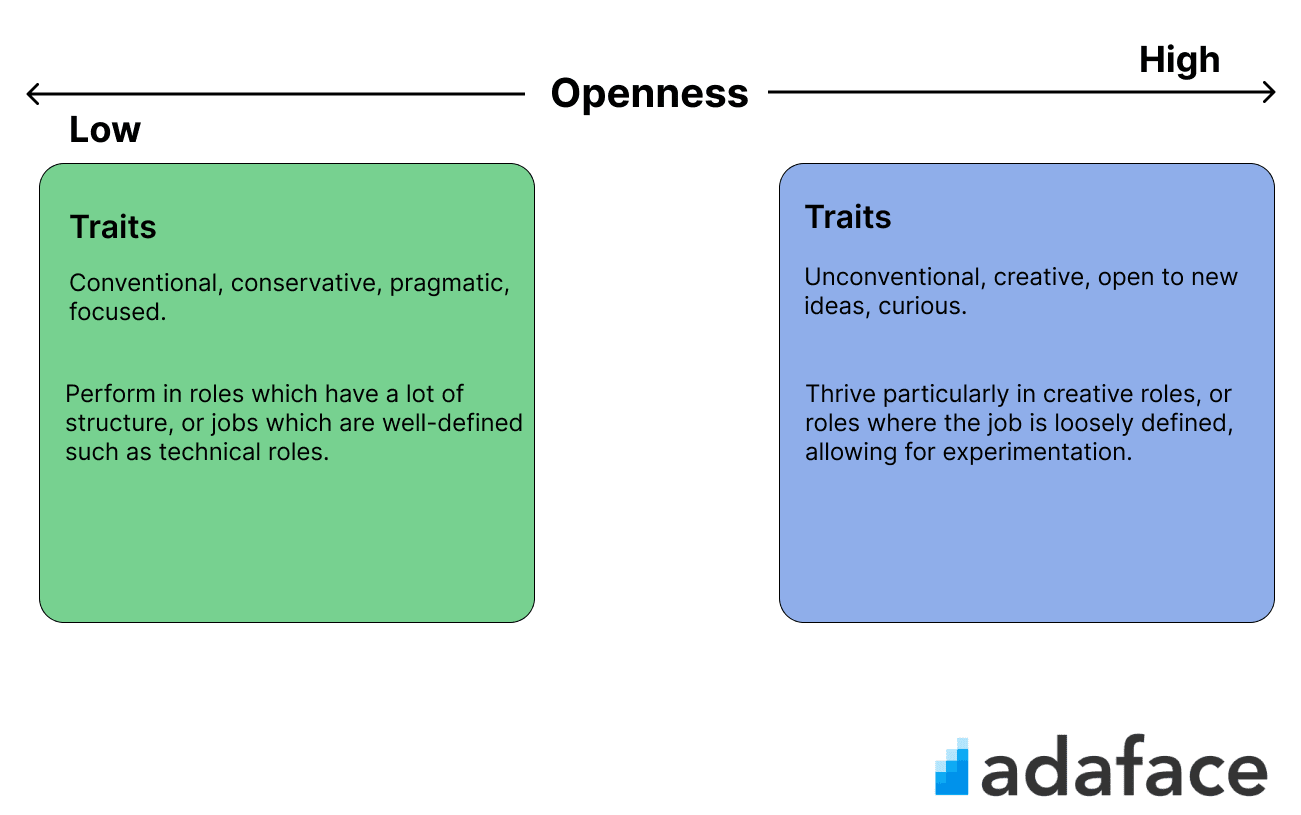
Let us go back to the Manager you hired when you started reading this blog post. If the candidate had taken this personality test, you would have noticed that they scored low on the openness scale, enabling you to make a better hire.
Conscientiousness
Conscientiousness refers to the active process of planning, organizing and carrying out tasks.
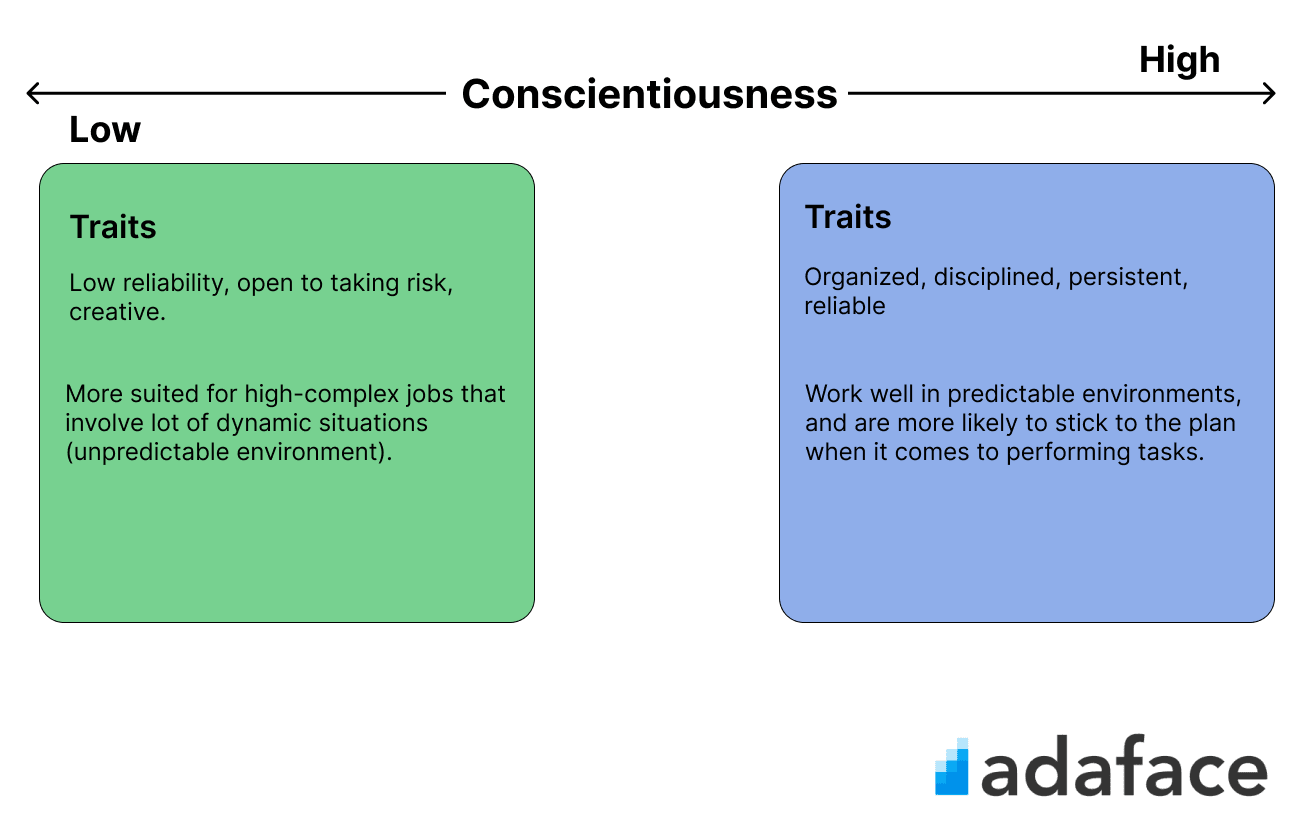
Conscientiousness is an important predictor of job performance as it shows a desirable effect on 98% of the occupational variables, i.e. attributes that predict success in the work place.
Extraversion
Extraversion includes traits such as sociability, assertiveness and talkativeness.
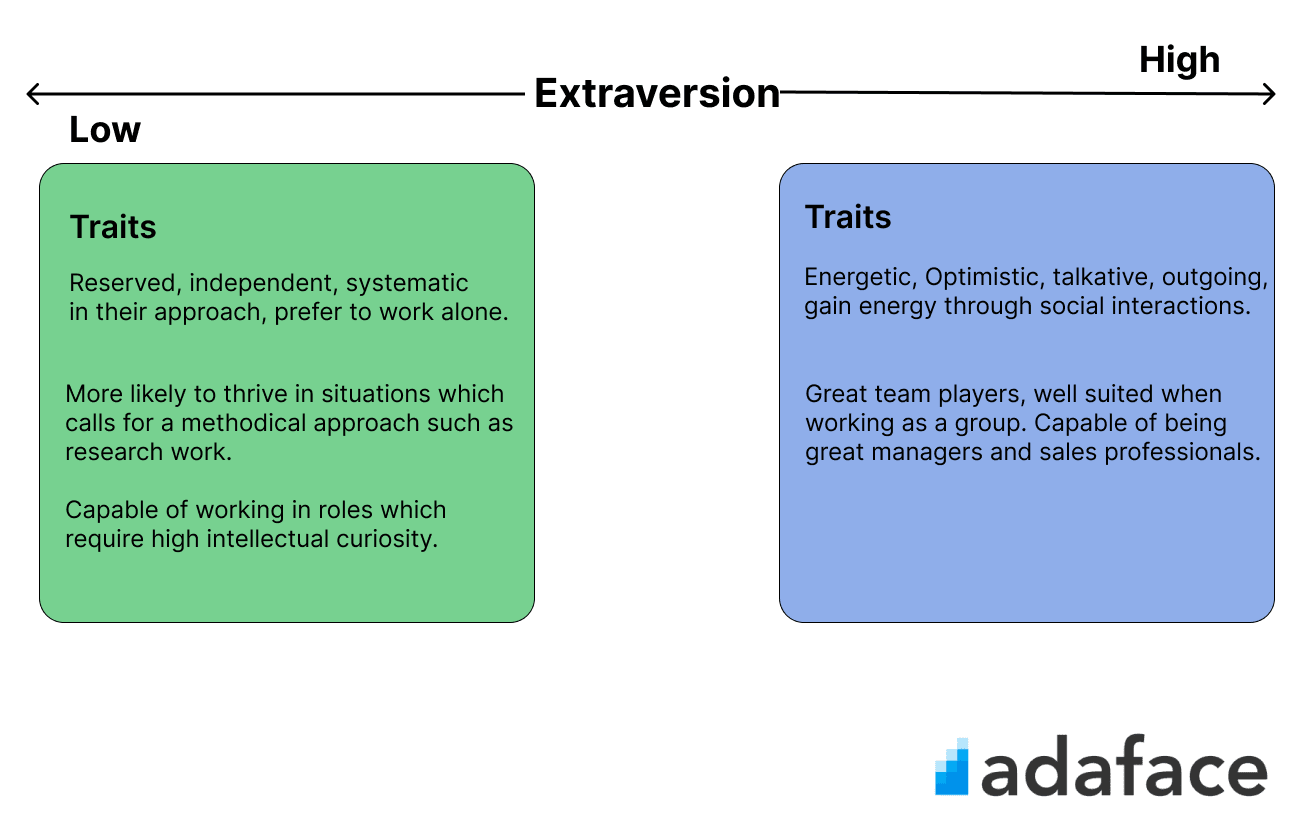
There is a high possibility that you, a recruiter, would obtain higher scores on the extraversion scale, seeing as to how you constantly interact with potential candidates. Studies show that extraversion is a desirable trait in 90% of job performance related attributes, which implies that you have a persistent advantage at work.
Agreeableness
An agreeable person is sympathetic to others, eager to help them, and believes others will be equally helpful.
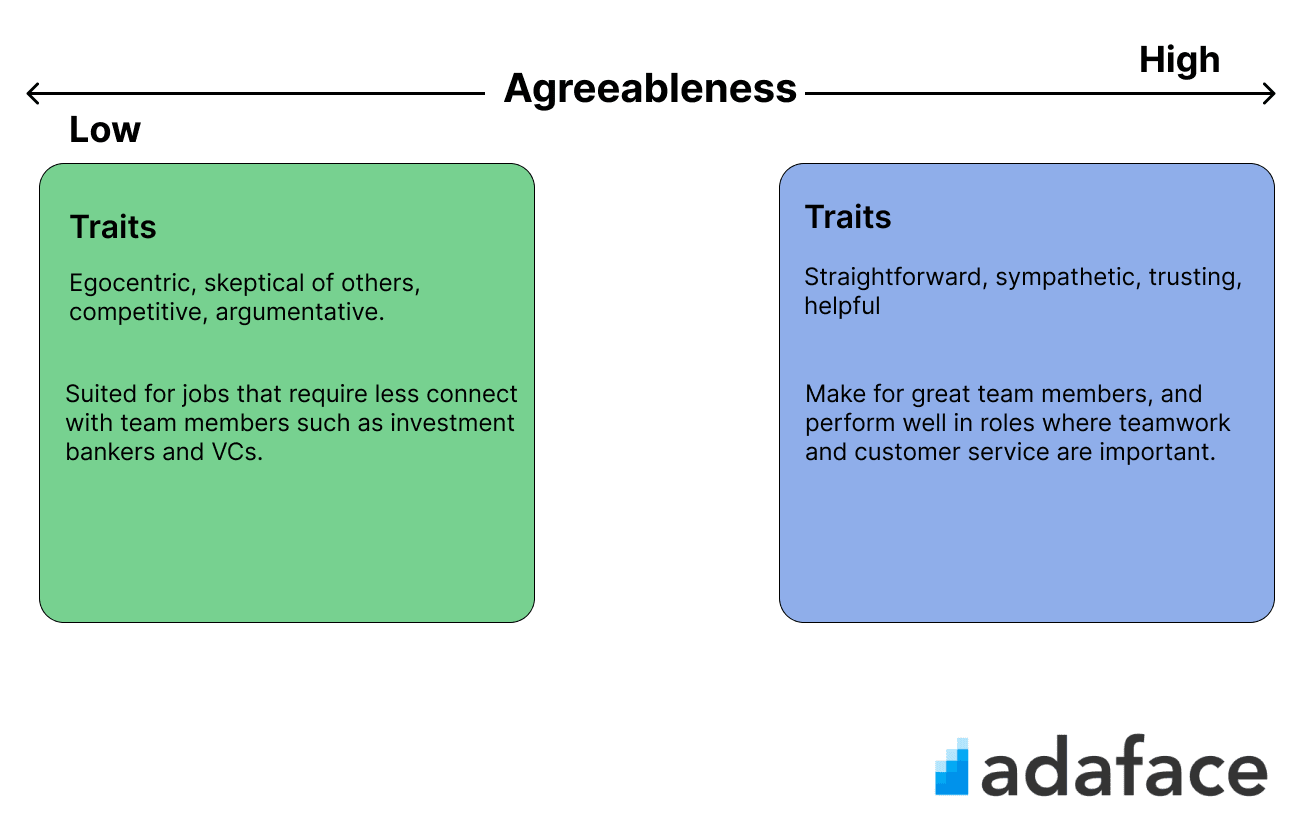
When you have a candidate with a higher agreeable score, be sure to know that they will make for great teammates at work.
Neuroticism
Neuroticism is a personality factor indicating the tendency to experience negative feelings such as fear, embarrassment, anger, and guilt.
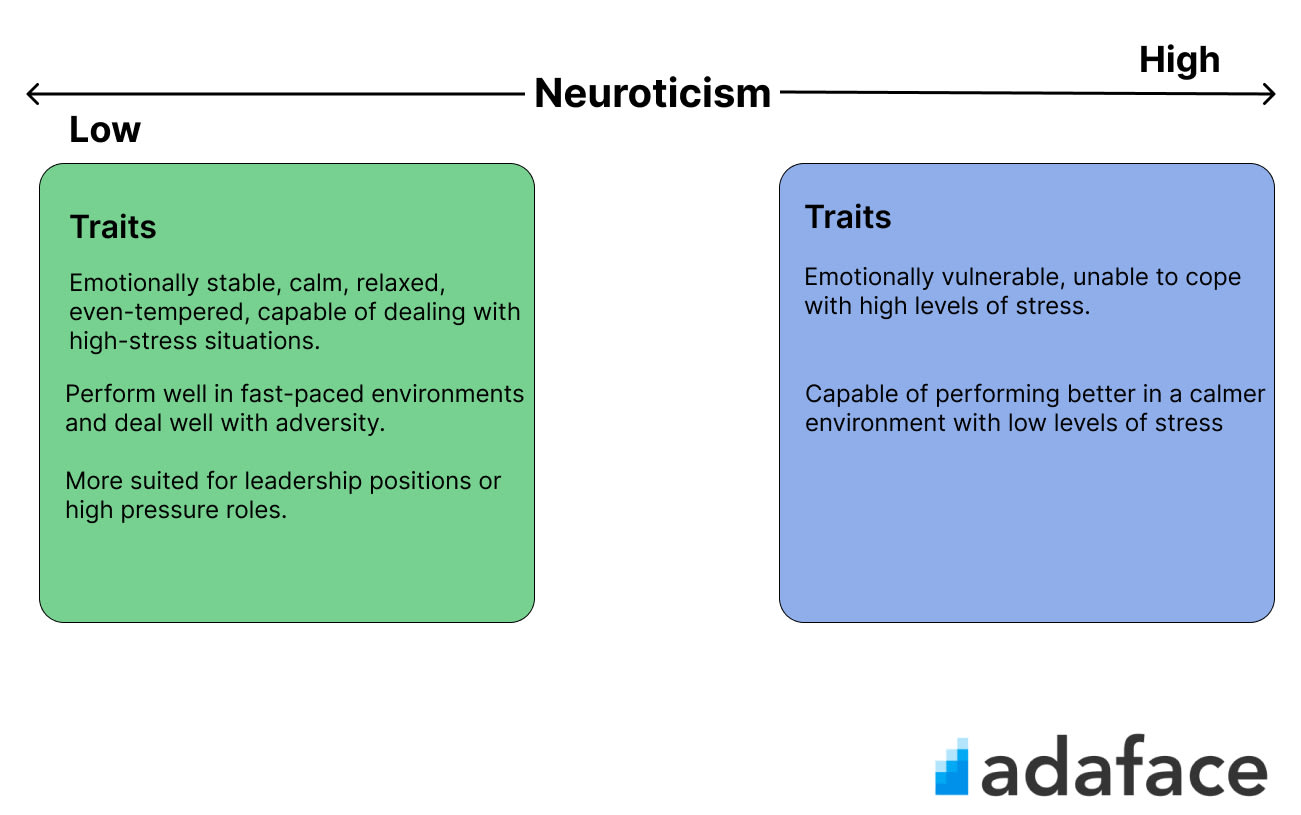
Research shows that emotional stability (low neuroticism) is the 2nd most crucial characteristic for employability.
Origin of the Big 5 Personality Traits
Psychology studies have been happening forever to classify human behaviour. Initially, the classification was done into 4000 groups and then to 16. Both ended up being complicated (4000 groups is a lot). The classification of human behaviour was narrowed down to 5 broad personality traits that were discussed above.
This classification is one of the most researched and developed psychology studies. As a result, the Big 5 Personality Test is preferred by organizations everywhere to help them make better hiring decisions. This gives us a segue into our next section, The Big 5 Personality Test.
The Big 5 Personality Test
A candidate who takes the test is assigned scores on each of the five personality dimensions, which helps you, the recruiter, better understand how they would react in critical job-related scenarios.
How is it measured?
If you are wondering whether each candidate has a bunch of wires stuck on them which help you deduce their personality by the signals coming from their head - No, that is definitely not what is being done.
Like any other test, the candidate answer's a bunch of questions/statements, and a score is assigned for each of the five personality traits. It is not a 0 or 1 score, but it shows the extent to which the candidate has said personality.
Are they reliable?
You now have an overview of the Big 5 Personality Test (Big 5 Model or BFM). But why use this for hiring decisions? There are two main reasons why:
i. Broad nature of classification
The BFM is classified into five broad personality dimensions. This is superior to classifying a candidate's personality into narrow dimensions, as research shows that every individual lies in these five personality dimensions.
ii. Quantifying nature of the model
The test does not give you a 0 or 1 answer to your candidate's responses. Instead, it assigns a value on a scale which shows to what extent a particular personality trait exists in the candidate.
How do you use the Big 5 Personality Test in the workplace?
So far, you have understood why personality tests, particularly the Big 5 Personality test, help make better hiring decisions. With the scores for each personality trait, you can now better understand who the candidate is and their predisposed behavioural patterns. Pairing this with other tools such as technical and aptitude tests, an informed decision can now be made.
You can not only use BFM for making new hires but also to help make your work environment as friendly and efficient as possible. But how? By using the BFM for evaluating existing employees, you can ensure a well-balanced culture fit throughout your workforce.
The Adaface Psychometry Profiling System
Technical and aptitude tests show cognitive ability, while personality tests provide insights into how candidates behave in a work context and predict job performance and company fit.
This shows that having just an aptitude test or a personality test in your hiring process will not do complete justice for you. This is where the Adaface Psychometry Profiling System stands out. It is a combination of an aptitude test and a personality test (BFM) and thus gives you a holistic view of the candidate you are evaluating.
On a Final Note
One must remember that personality tests are not the sole driver for hiring decisions. It is just one of the factors that help make the right hire for your organization. When paired with other tools such as technical rounds, aptitude tests and interviews, personality tests can be helpful and enable you to make a well-informed hiring decision.
If you want to know more about Adaface's Personality Tests, check out our website.
FAQs
What are Personality Tests?
Personality Tests are tools used to self-assess a human's personality. They primarily consist of questions/statements used to predict an individual's predisposed behaviour tendencies.
What is the difference between the Big 5, OCEAN and Five Factor Model?
No difference exists between the Big 5, OCEAN and Five Factor Model of Personality Traits. They are all terms used to signify the five broad personality dimensions - Openness, Conscientiousness, Extraversion, Agreeableness, and Neuroticism.

Pragnesh is the EiR at Adaface. He loves reading books more than scrolling through social media, which is a big deal if you ask him.
Spending too much time screening candidates?
We make it easy for you to find the best candidates in your pipeline-
with a 40 min skills test.


